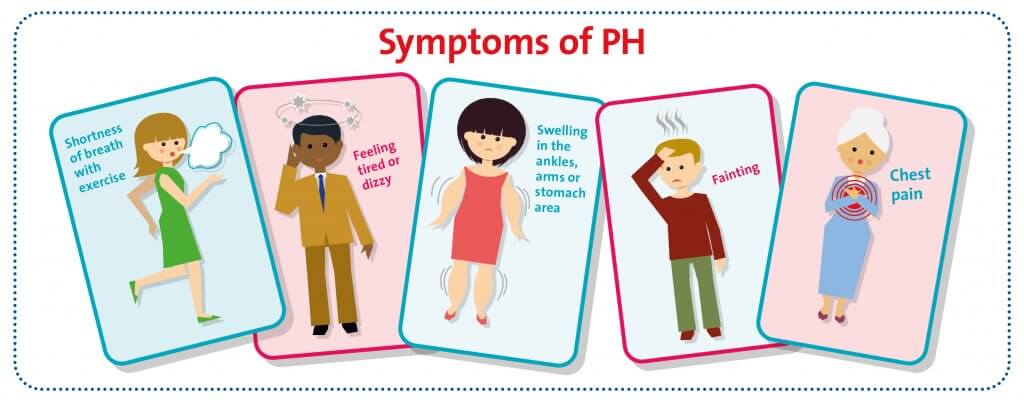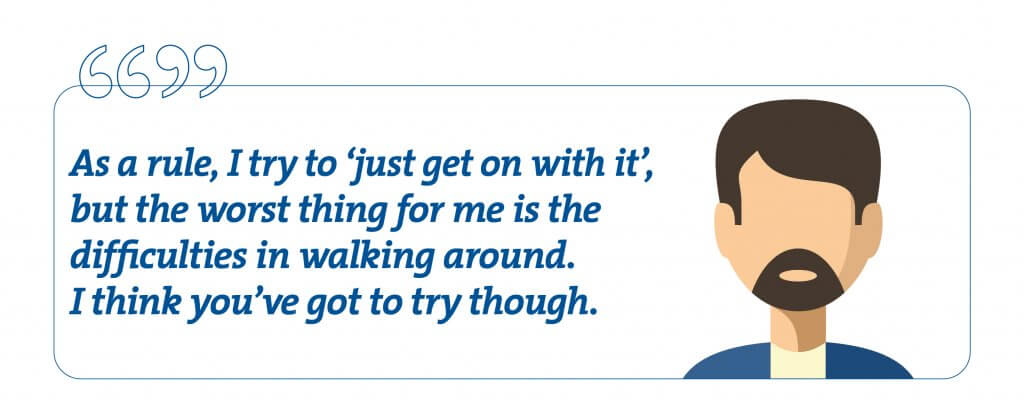If you, or a family member or friend has been recently diagnosed with pulmonary hypertension (PH), it is likely you will have lots of questions. We hope you find this section helpful.
PH isn’t always easy to explain, and many people confuse the condition with high blood pressure. The following explanation may help:
Pulmonary hypertension (often shortened to PH) is a rare and serious condition that causes high blood pressure in the blood vessels connecting the heart and lungs (the pulmonary arteries).
When a person develops PH, the walls of the pulmonary arteries become stiff and thickened, or blocked by blood clots. This makes it difficult for them to expand; and trying to pump blood through these tightened, narrowed, scarred or blocked arteries puts increasing strain on the right side of the heart as it tries to do its job. The essential task of pumping blood into the lungs to pick up oxygen which can then be circulated to every cell in the body becomes much harder.
You may also find it helpful to direct people to this short animation. A more scientific video can be found here.

After you have been diagnosed with PH your specialist PH team will discuss treatment options with you. The treatments you receive will depend on the type of PH you have and how severe it is.
Decisions about treatment will be made together with you, so you will be fully involved. Please do not be afraid to ask questions or voice any concerns; remember, the team are there to help.
There are nine specialist PH centres in the UK and Ireland which look after people with PH. You can choose which specialist centre you are treated at.
The UK’s network of specialist centres are world-leading, so rest assured you will be in good hands.
You normally only visit your specialist PH centre once or twice a year, although sometimes you may need to visit it every 3 or 4 months.
There is currently no cure for most types of PH, but a range of highly advanced treatments help to control symptoms and ensure you can enjoy a good quality of life. You can find out more about these treatments here.
Some people with PH, who do not respond to treatment therapies, may undergo a lung and / or heart transplant. Whilst this will mean they no longer have PH, it does come with significant complications and is a big decision. Find out more about transplant surgery and PH here.
Patients with a type of PH called Chronic Thromboembolic Pulmonary Hypertension (CTEPH) may undergo surgery to remove the blockages in their pulmonary arteries and this can potentially be curative. Click here for more information.
This is a very common question but one that is not simple to answer. PH is classed as a ‘life-shortening’ or ‘life-limiting’ disease, but the outlook is different for each person. It depends on a number of things:
Overall, the outlook for people with PH has improved dramatically over the last 20 years. This is because of the introduction of new, effective treatments for PH.
You may see some literature make reference to an ‘average life expectancy’ for someone with PH. We do not believe this is accurate or helpful, due to the reasons highlighted above.
It is also worth remembering that an ‘average’ can be influenced by many different things and whenever an average is used to represent an uncertain quantity, it ends up distorting the results because it ignores the impact of the variations.
Please speak to your specialist team about prognosis, and they will be able to discuss this with you based on your individual circumstances.
There are several different treatments available for PH. These include conventional treatments (often called supportive or background therapy) and targeted treatments.
Some treatments for PH can help improve symptoms and some may slow disease progression and reverse damage to the heart and lungs.
For more information about different treatments for PH visit the Treatments section, or talk to your specialist PH team.
Your specialist PH team will discuss the best treatment options with you. If you have any questions or concerns, don’t hesitate to ask.
Having PH will affect you on a day-to-day basis but that doesn’t mean it has to stop you doing the things you like.
You may feel more tired than usual or become breathless doing simple tasks such as housework or walking up stairs. You may have to take your treatments at certain times of the day, which could impact on daily activities.
There is lots you can do to make life easier. Be kind and patient with yourself; it may take time to get used to new routines or a new ‘normal’, but there is lots of help available.
Targeted medication for your PH will be free, but unfortunately you will still be required to pay for other medication you may take, even if this is connected to having PH. For example, blood thinners, pain relief or antibiotics will still carry a prescription charge unless you are exempt for other reasons (please click here to check if you qualify for exemption).
If you pay for your prescriptions and you require more than one per month, it is cheaper to get a prescription pre-payment certificate (PPC) – which lets you get as many NHS prescriptions as you need for a set price. Find out more and order a PPC here.

If you have any questions that are not covered by this section, please call our team on 01709 761450 or email office@phauk.org and we will do our best to help.